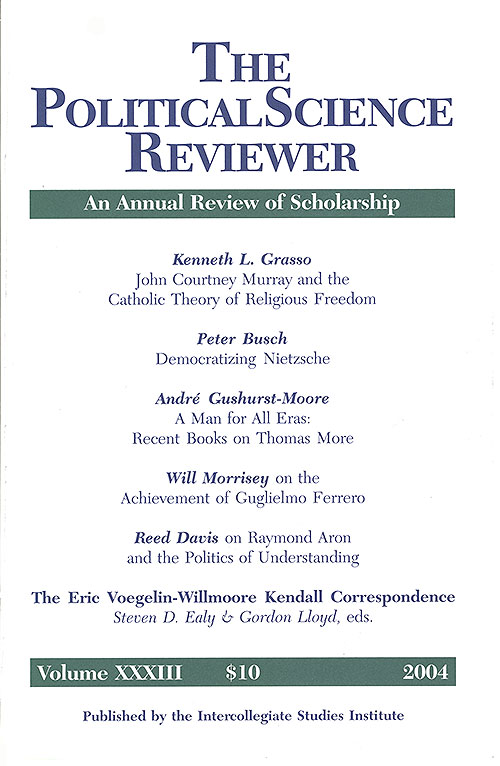Keywords
nietzsche
How to Cite
Democratizing Nietzsche. (2004). The Political Science Reviewer, 33, 62-89. https://politicalsciencereviewer.wisc.edu/index.php/psr/article/view/431
Abstract
Political scientists in the United States today are overwhelmingly—I am tempted to say, universally—democrats. There are of course conservatives, liberals, and radicals; utilitarians, neo-Kantians, and communitarians; defenders of the free market, of classical virtue, and of the oppressed. The list goes on. But to my knowledge, no one, including myself, seriously urges people to replace democratic government with some thoroughly undemocratic regime—with an aristocracy, for example, or theocracy, or monarchy. Scholars now consider any such position beyond the pale.
Similar Articles
- Lee Trepanier, Camus, Nietzsche, and the Cartesian Subject: Political Community in Postmodernity , The Political Science Reviewer: Vol. 46 No. 2 (2022): Jefferson, Paine, Tolstoy, Frankenstein, and more!
- Jerry Weinberger, But Which Gods Will Save Us? The Political Legacy of Nietzsche and Heidegger , The Political Science Reviewer: Vol. 16 (1986): In Memoriam and Reviews
- Mark Blitz, Heidegger’s Nietzsche , The Political Science Reviewer: Vol. 22 (1993): Essays
- Mark Blitz, Heidegger’s Nietzsche , The Political Science Reviewer: Vol. 23 (1994): Essays
- Robert Devigne, Plato, Nietzsche, & Strauss , The Political Science Reviewer: Vol. 26 (1997): The Scholarship of George Anastaplo: A Symposium
- Mark Blitz, A Symposium on Kant Studies , The Political Science Reviewer: Vol. 30 (2001): Symposia on Kant Studies and on <em>I’ll Take My Stand</em>
- Mark Blitz, Heidegger During the War , The Political Science Reviewer: Vol. 42 No. 1 (2018): Symposium: Philosophy in Weimar Germany
- Philip Bunn, Silicon Valley Stoics? , The Political Science Reviewer: Vol. 46 No. 1 (2022): Symposium on Political Theology
- Dustin Sebell, An Achilles Without a Zeus , The Political Science Reviewer: Vol. 48 No. 1 (2024): Essays
You may also start an advanced similarity search for this article.
Most read articles by the same author(s)
- Alexander J Groth, Demonizing the Germans , The Political Science Reviewer: Vol. 32 (2003): A Symposium on Bertrand de Jouvenel
- Douglas Walker, Michael Giles, Tocqueville Reconsidered: On Secular Morality and Religion’s Place in Liberal Democracy , The Political Science Reviewer: Vol. 43 No. 1 (2019): Essays
- Richard M Gamble, The United States as World Savior , The Political Science Reviewer: Vol. 38 (2009): A Symposium on Rémi Brague’s <em>The Law of God: The Philosophical History of an Idea</em>
- Robert Anthony Waters, How Socialism Underdeveloped Africa , The Political Science Reviewer: Vol. 34 (2005): Eric Voegelin’s <em>New Science of Politics</em>: A 50th Anniversary Symposium
- Michael Federici, The Politics of Prescription , The Political Science Reviewer: Vol. 35 (2006): Symposia on Edmund Burke and on Russell Kirk’s <em>The Conservative Mind</em>
- Mark G Malvasi, Kirk among the Historians , The Political Science Reviewer: Vol. 35 (2006): Symposia on Edmund Burke and on Russell Kirk’s <em>The Conservative Mind</em>
- Glenn A Moots, The Bible, the Founders, and Christian America , The Political Science Reviewer: Vol. 41 No. 2 (2017): Symposium: The Life and Work of Christopher Dawson
- Sonu Bedi, Review of Mere Civility: Disagreement and the Limits of Toleration , The Political Science Reviewer: Vol. 42 No. 2 (2018): Symposium: The Political Thought of Robert Nisbet
- Lee Trepanier, Culture and History in Eric Voegelin and Christopher Dawson , The Political Science Reviewer: Vol. 41 No. 2 (2017): Symposium: The Life and Work of Christopher Dawson
- Grant Havers, Was Spinoza a Liberal? , The Political Science Reviewer: Vol. 36 (2007): A Symposium on Leo Strauss and His Students
